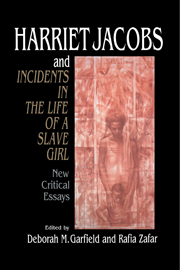Book contents
- Frontmatter
- Contents
- Introduction: Over-exposed, Under-exposed: Harriet Jacobs and Incidents in the Life of a Slave Girl
- “I Disguised My Hand”: Writing Versions of the Truth in Harriet Jacobs's Incidents in the life of a Slave Girl and John Jacobs's “A True Tale of Slavery”
- Through Her Brother's Eyes: Incidents and “A True Tale”
- Resisting Incidents
- Manifest in Signs: The Politics of Sex and Representation in Incidents in the life of a Slave Girl
- Earwitness: Female Abolitionism, Sexuality, and Incidents in the life of a Slave Girl
- Reading and Redemption in Incidents in the Life of a Slave Girl
- Harriet Jacobs, Frederick Douglass, and the Slavery Debate: Bondage, Family, and the Discourse of Domesticity
- Motherhood Beyond the Gate: Jacobs's Epistemic Challenge in Incidents in the Life of a Slave Girl
- “This Poisonous System”: Social Ills, Bodily Ills, and Incidents in the Life of a Slave Girl
- Carnival Laughter: Resistance in Incidents
- Harriet Jacobs, Henry Thoreau, and the Character of Disobedience
- The Tender of Memory: Restructuring Value in Harriet Jacobs's Incidents in the Life of a Slave Girl
- Conclusion: Vexed Alliances: Race and Female Collaborations in the Life of Harriet Jacobs
- List of Contributors
- Index
- CAMBRIDGE STUDIES IN AMERICAN LITERATURE AND CULTURE
Earwitness: Female Abolitionism, Sexuality, and Incidents in the life of a Slave Girl
Published online by Cambridge University Press: 22 January 2010
- Frontmatter
- Contents
- Introduction: Over-exposed, Under-exposed: Harriet Jacobs and Incidents in the Life of a Slave Girl
- “I Disguised My Hand”: Writing Versions of the Truth in Harriet Jacobs's Incidents in the life of a Slave Girl and John Jacobs's “A True Tale of Slavery”
- Through Her Brother's Eyes: Incidents and “A True Tale”
- Resisting Incidents
- Manifest in Signs: The Politics of Sex and Representation in Incidents in the life of a Slave Girl
- Earwitness: Female Abolitionism, Sexuality, and Incidents in the life of a Slave Girl
- Reading and Redemption in Incidents in the Life of a Slave Girl
- Harriet Jacobs, Frederick Douglass, and the Slavery Debate: Bondage, Family, and the Discourse of Domesticity
- Motherhood Beyond the Gate: Jacobs's Epistemic Challenge in Incidents in the Life of a Slave Girl
- “This Poisonous System”: Social Ills, Bodily Ills, and Incidents in the Life of a Slave Girl
- Carnival Laughter: Resistance in Incidents
- Harriet Jacobs, Henry Thoreau, and the Character of Disobedience
- The Tender of Memory: Restructuring Value in Harriet Jacobs's Incidents in the Life of a Slave Girl
- Conclusion: Vexed Alliances: Race and Female Collaborations in the Life of Harriet Jacobs
- List of Contributors
- Index
- CAMBRIDGE STUDIES IN AMERICAN LITERATURE AND CULTURE
Summary
The Ravishing of the Ear: Oral Agency, Seduction, and the Female Abolitionist
At the first convention of the American Anti-Slavery Society in 1833, members called for the mobilization of free blacks and ex-slaves as professional “agents” who would bear oral witness to the wrongs of captivity. Writing to Theodore Weld in 1838, the abolitionist Angelina Grimké champions these roving lecturers by exalting the dynamic between the listener's ear and the speaker's ignited voice: The slave's “narratives” must “come burning from his own lips. … Many and many a tale of romantic horrors can the slaves tell.” In her pun at Pennsylvania Hall, Grimke endorses hearing as an almost mystical transportation into the space of political reform – the “here” of the Hall itself: “Here it – hear it. … Every man and woman present may do something … by opening our mouths for the dumb and pleading the cause of those who are ready to perish.” The outrage of abolitionists like Grimke consistently took the form of meticulous rhetorical suasion. But she and other cohorts understood that an impassioned speech might, by ravishing the senses, open consciousness to reason.
If Grimke often relied on what might seem the conventionally “feminine” Radcliffean allure of such oral testimonies, John Collins, a correspondent to William Lloyd Garrison, also intuited the talismanic aura that an audience, seized by slavery's “romantic horror,” might hear in an agent's lectures. “The public,” he notes, “have itching ears to hear a colored man speak, and particularly a slave. Multitudes will flock to hear one of his class speak.”
- Type
- Chapter
- Information
- Harriet Jacobs and Incidents in the Life of a Slave GirlNew Critical Essays, pp. 100 - 130Publisher: Cambridge University PressPrint publication year: 1996
- 16
- Cited by



